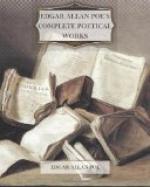Not from the grand old masters,
Not from the bards sublime,
Whose distant footsteps echo
Through the corridors of Time.
For, like strains of martial music,
Their mighty thoughts suggest
Life’s endless toil and endeavor;
And to-night I long for rest.
Read from some humbler poet,
Whose songs gushed from his
heart,
As showers from the clouds of summer,
Or tears from the eyelids
start;
Who through long days of labor,
And nights devoid of ease,
Still heard in his soul the music
Of wonderful melodies.
Such songs have power to quiet
The restless pulse of care,
And come like the benediction
That follows after prayer.
Then read from the treasured volume
The poem of thy choice,
And lend to the rhyme of the poet
The beauty of thy voice.
And the night shall be filled with music,
And the cares that infest
the day,
Shall fold their tents like the Arabs,
And as silently steal away.
With no great range of imagination, these lines have been justly admired for their delicacy of expression. Some of the images are very effective. Nothing can be better than
—the
bards sublime,
Whose distant footsteps echo
Down the corridors of Time.
The idea of the last quatrain is also very effective. The poem on the whole, however, is chiefly to be admired for the graceful insouciance of its metre, so well in accordance with the character of the sentiments, and especially for the ease of the general manner. This “ease” or naturalness, in a literary style, it has long been the fashion to regard as ease in appearance alone—as a point of really difficult attainment. But not so:—a natural manner is difficult only to him who should never meddle with it—to the unnatural. It is but the result of writing with the understanding, or with the instinct, that the tone, in composition, should always be that which the mass of mankind would adopt—and must perpetually vary, of course, with the occasion. The author who, after the fashion of The North American Review, should be upon all occasions merely “quiet,” must necessarily upon many occasions be simply silly, or stupid; and has no more right to be considered “easy” or “natural” than a Cockney exquisite, or than the sleeping Beauty in the waxworks.
Among the minor poems of Bryant, none has so much impressed me as the one which he entitles “June.” I quote only a portion of it:
There, through the long, long summer hours,
The golden light should lie,
And thick young herbs and groups of flowers
Stand in their beauty by.
The oriole should build and tell
His love-tale, close beside my cell;
The idle butterfly
Should rest him there, and there be heard
The housewife-bee and humming bird.




